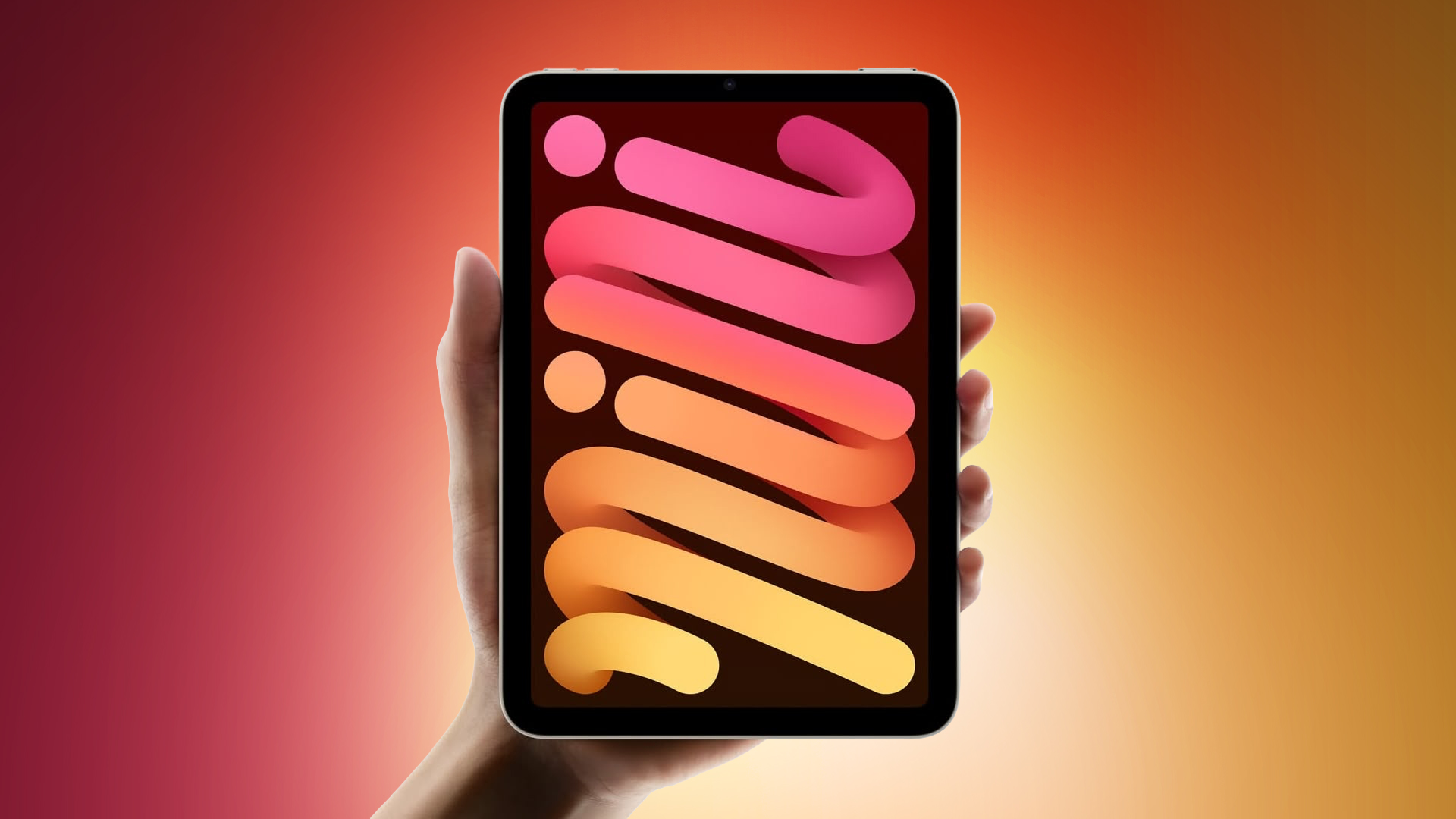Apple today introduced the iPad mini 7 with a faster A17 Pro chip, Apple Intelligence support, and Apple Pencil Pro support. In addition, the device also received a handful of smaller upgrades and changes compared to the previous model, as outlined below.
The new iPad mini can be ordered starting today, and it launches on Wednesday, October 23.
Here are six of the device’s smaller changes.
Faster USB-C Port
Apple says the USB-C port on the iPad mini 7 is capable of data transfer speeds of up to 10 Gbps, which is double the 5 Gbps limit on the iPad mini 6.
This upgrade allows for faster data transfer over a USB-C cable, for tasks such as exporting photos from the iPad mini to a Mac.
Here are the USB-C and Thunderbolt speeds for all recent iPad models:
Device
Specification
eSIM Only
Following in the footsteps of the iPad Pro and iPad Air, cellular models of the iPad mini no longer have a nano-SIM card slot worldwide. Unlike the iPad mini 6, the iPad mini 7 relies entirely on digital eSIM technology for cellular data plans.
Apple has a support document with helpful information about using an eSIM on an iPad.
Faster Wi-Fi
Like many other recent Apple devices, the iPad mini 7 supports faster Wi-Fi 6E.
Wi-Fi 6E extends the capabilities of the regular Wi-Fi 6 specification to the 6 GHz band, enabling faster wireless speeds and reduced signal interference. In addition to the iPad mini 7, you will need a router with Wi-Fi 6E support.
iPad mini 7 also supports Bluetooth 5.3.
Double the Base Storage
iPad mini 7 starts with 128GB of storage, compared to 64GB for the iPad mini 6. Better yet, the iPad mini continues to start at $499.
Improved HDR Photos
The new iPad mini supports Smart HDR 4, whereas the previous model supports Smart HDR 3.
Apple says Smart HDR 4 makes photos look “even more detailed and vivid.”
Here is how Apple previously described Smart HDR 4:Introduced with iPhone 13 Pro and iPhone 13, Smart HDR 4 uses intelligent segmentation to apply different adjustments for colour, contrast, and noise to the subject versus the background. This ensures faces are properly exposed in challenging lighting, and renders people in the same photo individually, with different adjustments optimized for lighting and skin tone for each person.
“iPad mini” Inscription
As noted by Parker Ortolani, the iPad mini 7 has an “iPad mini” inscription on the back of device. Previous models of the device merely show “iPad.”
teeny tiny detail, but the new iPad mini now actually says “mini” on the back like the other models from the past few years that got their modifiers added pic.twitter.com/EjSEqvJ4PE
— Parker Ortolani (@ParkerOrtolani) October 15, 2024
This article, “iPad Mini 7 Has These 6 Smaller Changes, Including a Faster USB-C Port” first appeared on MacRumors.com
Discuss this article in our forums
Apple today introduced the iPad mini 7 with a faster A17 Pro chip, Apple Intelligence support, and Apple Pencil Pro support. In addition, the device also received a handful of smaller upgrades and changes compared to the previous model, as outlined below.
The new iPad mini can be ordered starting today, and it launches on Wednesday, October 23.
Here are six of the device’s smaller changes.
Faster USB-C Port
Apple says the USB-C port on the iPad mini 7 is capable of data transfer speeds of up to 10 Gbps, which is double the 5 Gbps limit on the iPad mini 6.
This upgrade allows for faster data transfer over a USB-C cable, for tasks such as exporting photos from the iPad mini to a Mac.
Here are the USB-C and Thunderbolt speeds for all recent iPad models:
Device
Specification
iPad Pro (2021 and later)
Thunderbolt (Up to 40 Gbps)
iPad Pro (2018 and 2020)
USB 3.1 Gen 2 (Up to 10 Gbps)
iPad Air (2022 and later)
USB 3.1 Gen 2 (Up to 10 Gbps)
iPad Air (2020)
USB 3.1 Gen 1 (Up to 5 Gbps)
iPad mini (2024)
USB 3.1 Gen 2 (Up to 10 Gbps)
iPad mini (2021)
USB 3.1 Gen 1 (Up to 5 Gbps)
iPad (2022)
USB 2.0 (Up to 480 Mbps)
eSIM Only
Following in the footsteps of the iPad Pro and iPad Air, cellular models of the iPad mini no longer have a nano-SIM card slot worldwide. Unlike the iPad mini 6, the iPad mini 7 relies entirely on digital eSIM technology for cellular data plans.
Apple has a support document with helpful information about using an eSIM on an iPad.
Faster Wi-Fi
Like many other recent Apple devices, the iPad mini 7 supports faster Wi-Fi 6E.
Wi-Fi 6E extends the capabilities of the regular Wi-Fi 6 specification to the 6 GHz band, enabling faster wireless speeds and reduced signal interference. In addition to the iPad mini 7, you will need a router with Wi-Fi 6E support.
iPad mini 7 also supports Bluetooth 5.3.
Double the Base Storage
iPad mini 7 starts with 128GB of storage, compared to 64GB for the iPad mini 6. Better yet, the iPad mini continues to start at $499.
Improved HDR Photos
The new iPad mini supports Smart HDR 4, whereas the previous model supports Smart HDR 3.
Apple says Smart HDR 4 makes photos look “even more detailed and vivid.”
Here is how Apple previously described Smart HDR 4:Introduced with iPhone 13 Pro and iPhone 13, Smart HDR 4 uses intelligent segmentation to apply different adjustments for colour, contrast, and noise to the subject versus the background. This ensures faces are properly exposed in challenging lighting, and renders people in the same photo individually, with different adjustments optimized for lighting and skin tone for each person.
“iPad mini” Inscription
As noted by Parker Ortolani, the iPad mini 7 has an “iPad mini” inscription on the back of device. Previous models of the device merely show “iPad.”
teeny tiny detail, but the new iPad mini now actually says “mini” on the back like the other models from the past few years that got their modifiers added pic.twitter.com/EjSEqvJ4PE— Parker Ortolani (@ParkerOrtolani) October 15, 2024 Related Roundup: iPad miniBuyer’s Guide: iPad Mini (Buy Now)Related Forum: iPadThis article, “iPad Mini 7 Has These 6 Smaller Changes, Including a Faster USB-C Port” first appeared on MacRumors.comDiscuss this article in our forums Read More MacRumors: Mac News and Rumors – All Stories
#Techno #PCWorld














